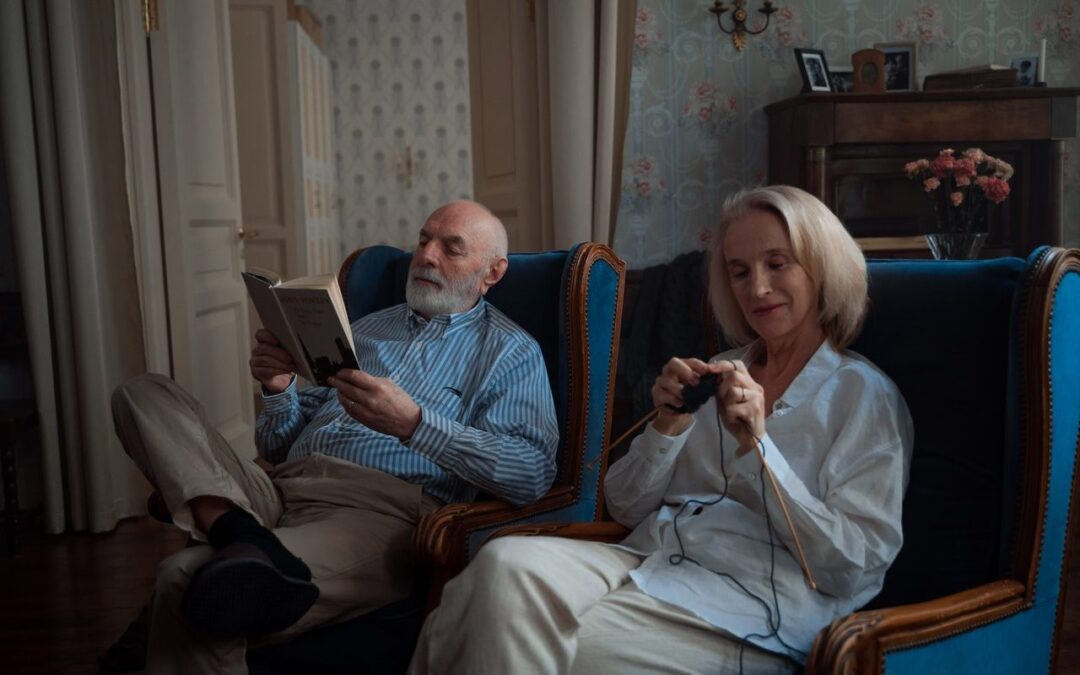“One Flesh” by Elizabeth Jennings is a poem depicting what is left of the relationship of elderly spouses. Physically, they are in close proximity, but emotionally they are completely isolated. After many years of marriage, their passion faded as distance between them grew. But is it all that sad? Let’s figure it out!
“One Flesh” by Elizabeth Jennings
Elizabeth Jennings is a British poetess, a master of intimate philosophical lyrics. Religious attitudes had a great influence on her work. Jennings’ poems are often characterized by deep self-analysis where the author plays the role of an outside observer. “One Flesh” is a good example of that:
Lying apart now, each in a separate bed,
He with a book, keeping the light on late,
She like a girl dreaming of childhood,
All men elsewhere – it is as if they wait
Some new event: the book he holds unread,
Her eyes fixed on the shadows overhead.
Tossed up like flotsam from a former passion,
How cool they lie. They hardly ever touch,
Or if they do, it is like a confession
Of having little feeling – or too much.
Chastity faces them, a destination
For which their whole lives were a preparation.
Strangely apart, yet strangely close together,
Silence between them like a thread to hold
And not wind in. And time itself’s a feather
Touching them gently. Do they know they’re old,
These two who are my father and my mother
Whose fire from which I came, has now grown cold?
The poem’s structure
The poem consists of eighteen lines divided into three six lines. The rhyme is mostly free. Rhyming monosyllabic words sound clear and assertive. Polysyllabic words form a softer and (in this case) sadder rhyme. The slow rhythm mirrors the meaning of the poem.
First stanza
“One Flesh” by Elizabeth Jennings begins with a description of the elderly couple, each lying separately in their own bed. The indication of “now” (now) suggests that they were once close, but now it feels like being lonely together. Their bedtime activities also indicate their distance from each other: he lies with a book while she dreams of childhood. The latter hints at old age: usually, it is at life’s end that memories of childhood become brighter.
The spouses don’t talk to each other. Both do not just sleep in different beds, but live separate lives under the same roof. The turned on lights is another hint on aloofness as passion is usually associated with darkness. The conclusion suggests that for the man the book is a way to avoid communication with his wife. Her eyes are fixed on the ceiling for the same reason.
The eyes are often called the “mirror of the soul”: they are so individual and unique. Probably, the woman’s frozen look woman at this moment reflects her true feelings. The “shadows” she watches over are a metaphor for unfulfilled dreams. The mention of “shadows” can also indicate anxiety about the future.
Second stanza
Another metaphor for failed love is splinters (wreckage). The former passion of the spouses is contrasted with how motionless they lie now. The stanza uses two religious references.
“Confession” is one of the Roman Catholic sacraments. According to the author, the accidental touching of older people to each other is like a confession either in the absence of feelings, or, conversely, in their fullness, which does not require physical contact.
The confessional beginning in Jennings’ lyrics is a kind of “challenge to the inner darkness.”
Further, the poetess speaks of “chastity” – that is, the state of spiritual purity as a necessary condition for meeting God, the final goal of our life path.
Third stanza
Despite the fact that the couple lies apart, they are “strangely close together” — a paradox that suggests many years of marriage and mutual understanding without words. Then two lyrical metaphors follow: silence as a thread stretched between them, and a metaphor for time as a “feather touching them gently”.
At the end, the poetess uses a rhetorical question: “Do they know they’re old?” That is, time slips away quickly and it is easy not to notice the fading of passion.
The question at the end encourages the reader to reflect on their own experience. The piece ends on an ambiguous note. Is it a sad poem about a lonely old age in marriage, or a tender poem about relationships that do not require conversation anymore?
Beautiful goodnight poems for her
Poetic devices
The text relies on religious allusions. The title “One Flesh” is taken from Genesis 2:24: “Therefore shall a man leave his father and his mother, and shall cleave unto his wife: and they shall be one flesh.” For Jennings, a follower of the Catholic religion, this perception of marriage was an important part of her faith.
The poem is easy to understand thanks to its simple vocabulary and structure. The reader is invited to reflect on how attitudes and feelings are transformed over time.
The text is written in the third person: the narrator is distantly watching an elderly couple. Only in the last two lines does the first person singular appear – “I”, and we understand that the speaker is the daughter of an elderly couple.
Although the poem is primarily about the narrator’s parents, it also provides insight into herself and her views on love and marriage. In her eyes, a marriage that lasts a long time is doomed to the fading and loneliness of the spouses.
Do you agree with this opinion? Let us know in the comments!

